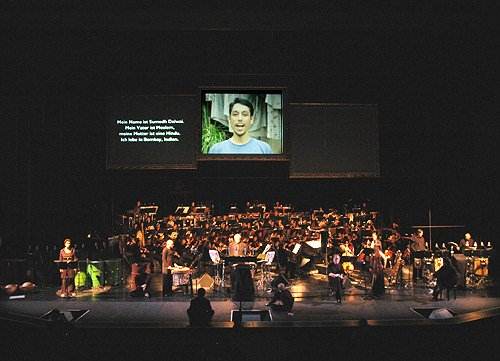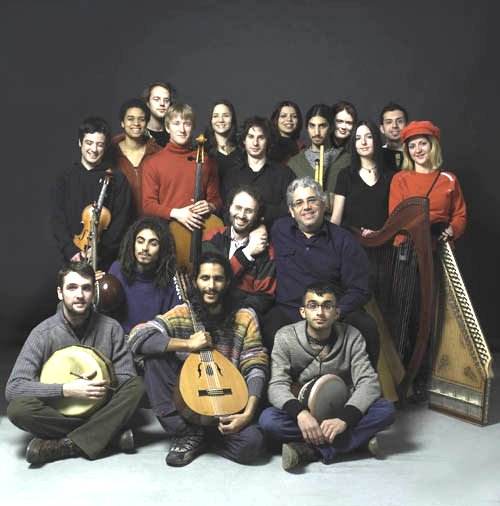S &
H International Concert Review
CREDO – the Innocence of God, Karlsruhe Opera House, Germany, 30th April 2004 (SM)
It's hard not to believe sometimes that some of the technological wizardry in projects labelled multimedia music theatre is used to cover up the paucity of a composer's ideas. Blind the audience with live satellite links, the World Wide Web and other modern-day hocus-pocus and they won't notice the drabness of the music. In addition, if you drop classically trained opera singers for more pop or folk-orientated, miked voices, you'll win a younger, trendier audience. And if you spice things up to boot with non-western sounds, say, from the Middle East, then you have a sure-fire recipe for some sort of trendy, cultural melting pot or world music fusion guaranteed to earn you brownie points among the politically correct arts pages of many a newspaper, even if the music itself is dross. On the face of it, Andrea Molino's CREDO, which was given its world premiere at the Staatstheater Karlsruhe on April 30, looked as if it might be just that.
"CREDO -- the Innocence of God. A multimedia music theatre" is its full title. A co-production between the Karlsruhe opera house and Fabrica, a communications think-tank belonging to the Benetton Group, the PR blurb described CREDO as a "global project, focussing on the theme of ethnic and religious conflict, in which music, video, interactivity, editorial, design and new technologies complement each other to achieve an extraordinary new form of communication." Oh dear.
A full symphony orchestra on stage, fronted by experimental vocalist David Moss, a host of other percussion players, and avant-garde instrumental and vocal soloists from Iceland, Switzerland, New Zealand, Germany and Italy, direct satellite links from ethnic music groups in Belfast, Istanbul and Jerusalem, all interspliced with state-of-the-art video images. It was enough to send any self-respecting music critic running with relief to the latest revival of La Boheme.
And in these complex, terror-ridden times, the wide-eyed, heart-on-your-sleeve politics of composer Andrea Molino, Fabrica's music director, who told journalists ahead of the premiere that CREDO aimed to "build bridges between different nations, cultures and religions" only fed the nagging scepticism.
However, Molino silenced any such misgivings as soon as he strode on stage and gave Karlsruhe's own house orchestra, the Badische Staatskapelle, its opening down beat. Dark, brooding sonic landscapes opened up, against which the phenomenal David Moss babbled, gurgled, whimpered and whooped his vocal acrobatics. He was joined by a troupe of seven actors who recited and declamed the libretto, a kaleidoscopic collage of texts written and compiled by Molino and Karlsruhe's "Generalintendant" Achim Thorwald. Percussion and instrumental soloists were placed on two raised podiums in the auditorium. Swiss-Ghanian singer Joy Frempong and Iceland's Gunnlaug Thorvaldsdottir took their place on either side of the stage to contribute their own, unique sounds.
Hanging over the orchestra were three screens onto which were projected video clips, talking heads of witnesses from the world's epicentres of ethnic and religious violence. At precisely timed moments, the screens also formed "windows" to the venues thousands of miles away where the three separate groups of handpicked Irish, Turkish and Israeli musicians played their own searingly beautiful compositions that slotted heterogeneously, but perfectly, into what was going on stage in Karlsruhe.
The Belfast contribution, with its traditional Irish feel, was performed on fiddles, pipes, harp and bohdran and was perhaps the most immediately accessible to western ears. But the contributions from Istanbul and Jerusalem were equally stunning, performed on traditional instruments such as the kanun, mey, darbuka, and the kamanche, ney flute and Spanish flute.
This was no patronising "crossover" project, using "world music" as a way of spicing up a western piece of culture, condescending to both audience and performers alike. The ethnic music was accepted on its own terms, given space and time to develop and breathe and weave its own spine-tingling spell. It was all about learning how to listen to each other, Molino said.
CREDO, spanning 110 minutes without a break, certainly went some way in teaching the first-night audience how to do that. Divided into five different sections, interwoven with the three satellite broadcasts, among the work's most moving and striking moments was a video testimony of families of suicide bombers. And the fifth and final section, entitled "The Bastards and the Assembly of the Lord", was one of the most powerful. It comprised interviews of racial and religious "bastards", men and women whose parents came from different and often violently opposed religions or races: the daughter of a Palestinian father and Jewish mother, the son of a Hindu mother and Moslem father, a man whose father was Protestant and mother Catholic. A whole number of multi-coloured and multi-cultural combinations, but every one of them happily expounding the advantages of coming from a mixed race or background. In a dazzling piece of improvisation on stage, a solo ‘cello (New Zealander Hugo Smit) exactly matched the voice patterns of some the interviewees.
The sheer logistical and technological complexity of CREDO means the work was performed only twice in Karlsruhe, two days apart. Thank goodness the performances, which received standing ovations, were captured in audio and video form, later to be released on DVD. It remains to be seen whether the recorded medium will be able to capture the energy and power of the live performance. But next year, CREDO is to be re-created at both the Istanbul International Music Festival and the Queensland Music Festival in Brisbane, Australia. My advice: don't be sniffy. Go and see it.
Simon Morgan


 Return to:
Return to: